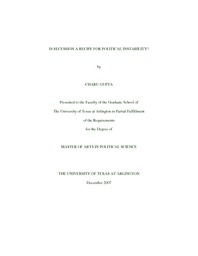
ATTENTION: The works hosted here are being migrated to a new repository that will consolidate resources, improve discoverability, and better show UTA's research impact on the global community. We will update authors as the migration progresses. Please see MavMatrix for more information.
Show simple item record
| dc.contributor.author | Gupta, Charu | en_US |
| dc.date.accessioned | 2008-04-22T02:41:21Z | |
| dc.date.available | 2008-04-22T02:41:21Z | |
| dc.date.issued | 2008-04-22T02:41:21Z | |
| dc.date.submitted | November 2007 | en_US |
| dc.identifier.other | DISS-1867 | en_US |
| dc.identifier.uri | http://hdl.handle.net/10106/688 | |
| dc.description.abstract | In the last century, the world has seen the rise and fall of empires, two world wars, and the subsequent creation of new states. Very little attention has been paid to how well these seceded states fared at self-governance. This thesis proposes a theory to explain the behavior of the governments of seceded states and examines three variables to determine how politically stable seceded states may be. For a comprehensive study, cases that gained independence between 1900 and 2000 were chosen from around the world with eight cases used for qualitative analysis and twenty cases for quantitative analysis. There is strong evidence that for seceded states to be politically stable the governments must adhere to their constitutional structures and the public needs to participate in the political process. | en_US |
| dc.description.sponsorship | Cichock, Mark | en_US |
| dc.language.iso | EN | en_US |
| dc.publisher | Political Science | en_US |
| dc.title | Is Secession A Recipe For Political Instability? | en_US |
| dc.type | M.A. | en_US |
| dc.contributor.committeeChair | Cichock, Mark | en_US |
| dc.degree.department | Political Science | en_US |
| dc.degree.discipline | Political Science | en_US |
| dc.degree.grantor | University of Texas at Arlington | en_US |
| dc.degree.level | masters | en_US |
| dc.degree.name | M.A. | en_US |
| dc.identifier.externalLink | https://www.uta.edu/ra/real/editprofile.php?onlyview=1&pid=1390 | |
| dc.identifier.externalLinkDescription | Link to Research Profiles | |
Files in this item
- Name:
- umi-uta-1867.pdf
- Size:
- 361.2Kb
- Format:
- PDF
This item appears in the following Collection(s)
Show simple item record


